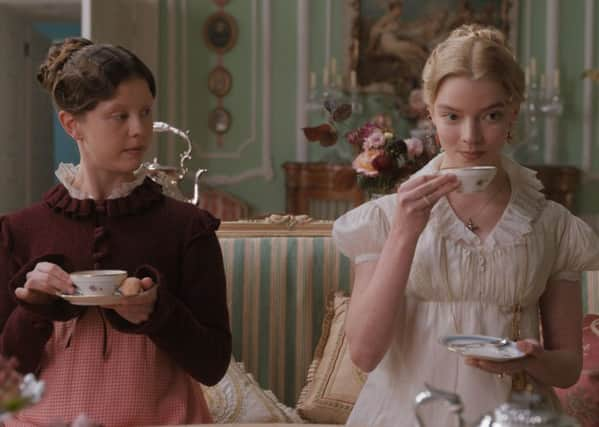Film reviews: Emma | Eminent Monsters | Mr Jones | Show Me the Picture


Emma (U) **
Eminent Monsters: A Manual for Modern Torture (15) ****
Mr Jones (15) ***
Show Me the Picture: The Story of Jim Marshall (15) ***
It’s hard to make Jane Austen boring but the new version of Emma does its best. Adapted by Eleanor Catton and directed by photographer-turned-filmmaker Autumn de Wilde (both making their debuts), it’s too constrained by the Richard Curtis-inflected house-style of production company Working Title to feel in anyway fresh, especially after Whit Stillman’s wickedly funny Austen adaptation Love & Friendship from 2016. Over-egging the various relationship misunderstandings with a jaunty score and fashion-shoot-style period finery, its biggest problem is the miscasting of Anya Taylor-Joy as Emma Woodhouse. As talented as she is, she seems unable to inject the character’s surface vapidity with any warmth or depth of feeling, which makes it harder to both delight in the misguided matchmaking and casual cruelty that normally makes the character such a hoot, or root for her when she has her own romantic awakening. The latter isn’t helped either by the lack of chemistry or tension between Emma and Mr Knightley, which is too bad because Beast-star Johnny Flynn actually does have the right kind of smouldering charisma to make the Woodhouse family’s honourable neighbour the perfect romantic foil. Elsewhere Josh O’Connor (God’s Own Country) gets cut loose for once as fatuous vicar Mr Elton and Miranda Hart is fine as Miss Bates, whose dullness is unkindly mocked by Emma. The real stand-outs, though are Mia Goth as Emma’s guileless ward Harriet Smith and Tanya Reynolds as Elton’s social-climbing wife; what a shame the title character in this version isn’t nearly as interesting.
Though the CIA’s post-9/11 deployment of human-rights-violating Enhanced Interrogation Techniques was dramatised recently in the excellent Adam Driver thriller The Report, the insidious use of government-sanctioned torture techniques dates back to the Cold War and the work of one man, Dr Ewen Cameron, a Scottish psychiatrist who pioneered the use of sleep deprivation and sensory assault to “treat” patients. His terrible legacy is explored in Stephen Bennet’s documentary Eminent Monsters, which traces Cameron’s career as he emigrated to the US to become a world-renowned psychiatrist by capitalising on the US, British and Canadian governments’ heavy investment in psychological warfare during the early days of the Cold War. Developing the very techniques that have since been roundly denounced as ineffective, the horrifying nature of Cameron’s work is sensitively explored through moving testimony from the surviving relatives of patients who were unaware that they were effectively being used as guinea pigs for the CIA. But the film also smartly broadens its scope to explore the far reaching consequences of Cameron’s work, particularly as counter-terrorism has escalated in scope over the last half-century or so. Approaching its subject with the sort of clear-eyed narrative focus normally found in Alex Gibney’s films, it’s an illuminating piece of work.
Advertisement
Hide AdAfter a brief prologue misleadingly frames Mr Jones as a movie about George Orwell’s creation of Animal Farm, this bleak but timely drama, directed by Agnieszka Holland (Europa Europa, In Darkness), zeroes in on Gareth Jones, the Welsh journalist whose work exposing Stalin’s genocidal starvation of the people of the Ukraine transformed Orwell’s thinking and inspired his classic fable. Though Orwell (played by Joseph Mawle) pops up intermittently, the film is really about Jones, played by James Norton, and his struggle to convince the political establishment and his fellow journalists to accept his ground-level reporting as fact, especially as his eye-witness accounts of the Holodomor contradict the dominant narrative coming out of the nascent Soviet Union and risk causing diplomatic calamities just as the British and American governments are looking to boost trade with Russia. Though the film doesn’t all hang together (the Orwell interludes feel a little superfluous), Holland finds subtly horrific ways to reveal the truth about the famine and Norton’s impassioned performance offers a compelling portrait of a crusading journalist unwilling to be fobbed off with counterfactual lies even when his life is on the line. Peter Saarsgard is also suitably odious as Walter Duranty, whose unquestioning reporting for the New York Times makes the parallels with today’s fake news narratives even starker.
The world arguably doesn’t need another documentary chronicle about a troubled 1960s maverick, but Show Me the Picture: The Story of Jim Marshall provides an entertaining document of the times nonetheless. Its subject is the rock photographer Jim Marshall, who was famous for being on the front line of pop culture during this tumultuous decade. He shot some of the most renowned portraits of Miles Davis, he captured The Beatles’ final American show at Candlestick Park, he embedded himself in Haight-Ashbury just as hippy culture was taking over; he caught Jimi Hendrix setting his guitar on fire at Monterey Pop and he was the only photographer given permission to document Johnny Cash’s gigs at Folsom Prison and San Quentin. He was also a volatile, gun-carrying reprobate who inspired Dennis Hopper’s portrayal of an out-of-his-mind photojournalist in Apocalypse Now, did a stint in prison himself, burned most of his bridges and became a coke-addled recluse. Director Alfred George Bailey gathers testimony from friends, ex-lovers, colleagues and professional admirers, all of whom talk with authority about the complexities of the man and his work; but it’s the pictures themselves that make this worth seeking out. ■